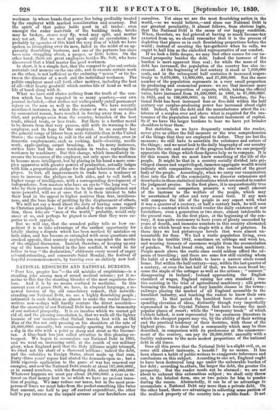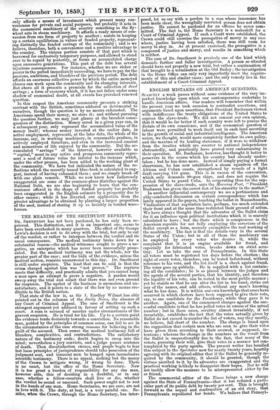NATIONAL RESOURCES AND NATIONAL BURDENS. "POST hoc. propter hoc"—the old
mistake of empiricism—is a standing joke among men of sound medical science ; yet it re- mains to this day the standing blunder of the most sagacious doc- tors. And it is by no means confined to medicine. In this current year of grace 1859, we have, in eloquent language, a re- newed version of the old consolatory remark, that notwith- standing our National Debt, we are a highly flourishing people ; intimated in such fashion as almost to make the reader fancy— writers now-a-days will hardly venture the direct assertion— that the enormity of our National Debt has assisted the immensity of our national prosperity. It is an incubus which we cannot get rid of, and the pleasing consolation is, that we walk all the lighter because of our incubus—that Sinbad travels best with an Old Man of the Sea not only pressing on his shoulders at the rate of 28,000,000/. annually, but occasionally spurring his energies by a dig in the ribs with a point so sharp and stout as the Income- tax. A blue-book has just called attention to this pleasing re- trospect. We began to accumulate our National Debt in 1695, and we went on increasing until, at the zenith of our military glory, when England paid that the Holy Alliance might triumph, we owed not far short of a thousand millions ; indeed the debt, and the subsidies to foreign States, about made up that sum. Forty-three years' repose had abated the demands upon us ; but a little vigorous application to the game of war has renewed our energies, and now the National Debt stands at about 787,000,0001., or in round numbers, with the floating debt, about 800,000,000/. Whatever happens we must pay about 28,000,0001. a year as in- terest on that money lent to us which we have no present inten- tion of paying. We May reduce our taxes, but in the most pros- perous of times we must take from the pocket something like twice that amount, one half to pay off current expenditure, the other half to pay interest on the unpaid arrears of our forefathers and ourselves. Yet since we are the most flourishing nation in the world,—so we would believe,—and since our National Debt is our greatest peculiarity, it almost follows, from obvious logic, that the National Debt is the cause of our happy condition. When, therefore, we feel grieved at having so much Income-tax extorted from us we should remember that it is the process of depletion that places us in such flourishing proportions before the world ; instead of scouting the tax-gatherer when he calls, we ought to hail him as the embodied representative of our comfort. If we look a little deeper, we may find other causes for our na- tional prosperity besides the debt. Indeed the increase of the burden is more apparent than real ; for while the mass of the debt has increased, the population of the country has also in- creased. At the beginning of last century it stood at 7,650,000 souls, and in the subsequent half centuries it increased respec- tively to 9,670,000, 15,800,000, and 27,500,000. But the mere number of the population represents in a very small proportion its producing and economical powers : we see that increase more distinctly in the proportion of exports, which, taking the official value, have increased from 24,500,0001. in 1801, to 47,000,000/. in 1825, and to 196,000,0001. in 1852. If, therefore, the Na- tional Debt has been increased four or five-fold within the half century our surplus-producing power has increased about eight fold. Indeed, both the debt and the manufactures attest-the ex- istence of a surplus over and above what is required for the sus- tenance of the population and the constant increment of capital. So if we have the larger burdens to bear we have yet broader shoulders to bear them.
But statistics, as we have frequently reminded the reader, never give us either the full measure or the true comprehension of the things that they are employed to define. They are but the measure; we still have to ascertain the substance and nature of the things ; and we must look to the daily biography of our country to learn the rate and nature of the progress before we can properly appreciate the things which these figures help us to compare. It is for this reason that we must know something of the life of the people. It might be that in a country socially divided into pri- vileged classes and unprivileged, immense aggregate wealth would indicate with comparative uncertainty the comfort of the great body of the people. Accordingly, when we carry our examination thus into the life of the community, we discover extensions and drawbacks in these statistical indications which areneeded to render the judgment precise. In the first place, it is unquestionably true that a numerical comparison presents a very small amount of the increase to the welfare of the people, which may be ascertained by other and very sound tests. If any man will compare the life of the people in any aspect with what it was a quarter of a century, or half a century back, he will soon perceive a contrast which would render the daily existence of our forefathers, even a generation or two since, almost intolerable to the present race. In the first place, at the beginning of the cen- tury, it was quite customary to have years of plenty succeeded by years of dearth, and immense numbers in this country alternated a diet in which bread was the staple with a diet of potatoes. In those days we had picturesque hovels that were almost un- tenantable for fleas. We had a rustic population living, even down to the terrible 1842, sometimes on cabbage and weak tea, and wearing trousers of enormous weight from the accumulation of patches. We had bread riots, and riots to break machinery. People much above the rustic class could seldom afford the ex- pense of travelling ; and there are some few still existing whom the habit of a whole life forbids to leave a narrow circle round home. But within the half century—nay, within the last quarter of a century, or even the last half of that, we have seen bread be- come the staple of the cottager as well as the artisan ; " conacre " disappearing in Ireland ; Ireland approaching the English standard of wages, England raising her own standard ; rus- tics assisting in the trial of agricultural machinery ; silk gowns becoming the Sunday garb of very humble classes in the towns ; railways placing the market of all England accessible to the humblest industry, and teaching the rudest to know their own country. In that period the humblest have shared a corre- sponding elevation of ideas, distinctly though very imperfectly represented in the Crystal Palaces that have become the most popular places of _resort ; while the "twopenny trash" of which Cobbett talked, is now represented by an enormous literature in which the cheapest papers may vie, by the ability of their writing and the practical tendency of their doctrine, with those of the highest price. It is clear that a community which may be thus described' in comparison with its predecessor at the commence- ment of the century, can pay its 28,000,000d. annually with a facility unknown to the more modest proportions of the national debt in old times.
Does all this prove that the National Debt isa slight evil, or, as some still almost insinuate, a benefit ? By no means. It has been almost a habit of public writers to exaggerate inferences and conclusions on this subject. According to one set, England ought to have been destroyed long ago under the unbearable burden of her debt; according' to.others, the larger the debt, the greater the prosperity. But the reader needs net be alarmed : we are not about to exhaust this exhaustless subject ; we shall only throw out, in the briefest form one or two points for him to ponder during the recess. Abstractedly, it can be of no advantage to accumulate a National Debt any more than a private debt. On the other hand, there are advantages in collecting some portion of the realized property of the country into a public fund. It not only affords a means of investment which present many con- veniences for private and social purposes, but probably it acts in the economical machinery of the country something as the fly- wheel acts in steam machinery. It affords a ready means of con- version from one form of property to another ; assists in keeping up a certain equilibrium in values of funded property, represent- ing distinctly the funded savings of the community ; and is we believe, therefore, both a convenience and a positive advantage to the country. The vicious portion consists of that part which is borrowed for exclusively temporary purposes, and allowed to stand over to be repair by posterity' or forms an accumulated charge upon successive generations. This part of the debt has several injurious consequences. For instance, whether we are richer or poorer in the period immediately succeeding, we have to pay for the passions, ambitions, and blunders of the previous period. The debt affords an enormous collective power by which the entire moneyed classes can work upon the community and its changing interests. But above all it presents a premium for the collection of dead savings ; a form of economy which, if it has not fallen under some shadow of economical doubt, at all events has provoked renewed question.-
In this respect the American community presents a striking contrast with the British, sometimes adduced as detrimental to ourselves, though the question is by no means exhausted. The Americans spend their money, we store it; and. without pursuing the question further, we may just glance at the broadest conse- quences of the distinction. Money saved in a given year can, in a subsequent year, only represent the accumulated value of the money itself; whereas money invested at the earlier date, in active employment, represents, at the later date, the whole of the increase, say, in working machinery, in consumable produce, in actively employed furniture, and even in the increased amount and momentum of life enjoyed by the community. But the ac- cumulated " savings " of the interval, however available as " capital," must in any active and prosperous community repre- sent a seed of future value far inferior to the increase which, under the other process, has been added to the working plant of the community. We have but indicated the nature of the re- flections which the recently issued blue-book is calculated to sug- gest, instead of having exhausted them ; and we simply break off with one plain remark. While we now know how ludicrously exaggerated are some of the common-place diatribes against the National Debt, we are also beginning to learn that the con- venience offered in the shape of funded property has probably been exaggerated in the English estimate by a prosperity due to other causes ; while it has diverted our application from the greater advantage to be obtained by planting a larger proportion of the seed, instead of storing it up so lavishly in bonded. ware- houses.



























 Previous page
Previous page